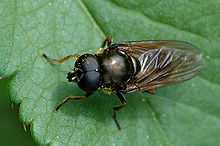Cheilosia albipila
| Cheilosia albipila | |
|---|---|
 | |
| Cheilosia albipila male | |
| Scientific classification | |
| Kingdom: | Animalia |
| Phylum: | Arthropoda |
| Class: | Insecta |
| Order: | Diptera |
| Family: | Syrphidae |
| Genus: | Cheilosia |
| Species: | C. albipila |
| Binomial name | |
| Cheilosia albipila Meigen, 1838 | |
| Synonyms | |
Cheilosia albipila is a European and Asian species of hoverfly. Like most Cheilosia it is black, and because of this may often be overlooked as a hoverfly. It is little recorded but probably widespread and common and maybe overlooked because adult flight periods are early in the year, before many hoverfly recorders are active.[3]
Distribution
It is distributed from Scandinavia to south of the Pyrenees, and from Ireland eastwards through much of northern and central Europe and European parts of Russia and central Siberia.[4]
Biology
The larvae of C. albipila feed inside the base of the stems of Marsh Thistles (Cirsium palustre') Adult Females lay eggs in the rosettes of mature plants in early spring when adults are most active. Usually there is only one larvae per plant and they feed by tunnelling up the pithy centre of the main thistles stem. The larvae mature about mid to late June in southern UK and then leave the plant to pupate in the soil around the thistle. Flight times of adults are Late February to May, peeking around mid April.[3]
References
- ↑ Stubbs, Alan E. and Falk, Steven J. (1983). British Hoverflies: An Illustrated Identification Guide. British Entomological & Natural History Society. pp. 253, xvpp.
- ↑ Chandler, Peter J. (1998). "Checklists of Insects of the British Isles (New Series) Part 1: Diptera". Handbooks for the Identification of British Insects 12. Royal Entomological Society. pp. 1–234.
- ↑ 3.0 3.1 Stuart Ball, Roger Morris and Alan Stubbs (2008-07-10). "Recording Cheilosia albipila and C. grossa by searching for larvae in thistles". Hoverfly Recording Scheme. Retrieved 2009-01-19.
- ↑ Radisic, P., Papadopoulos, G., Vujic, A. & Simic, S (2001). "Pollen Feeding of Cheilosia Albipila Meigen, 1838 (Diptera: Syrphidae)" (PDF). Acta entomologica serbica 6 (1): 83–92. ISSN 0354-9410. Retrieved 2010-05-27.